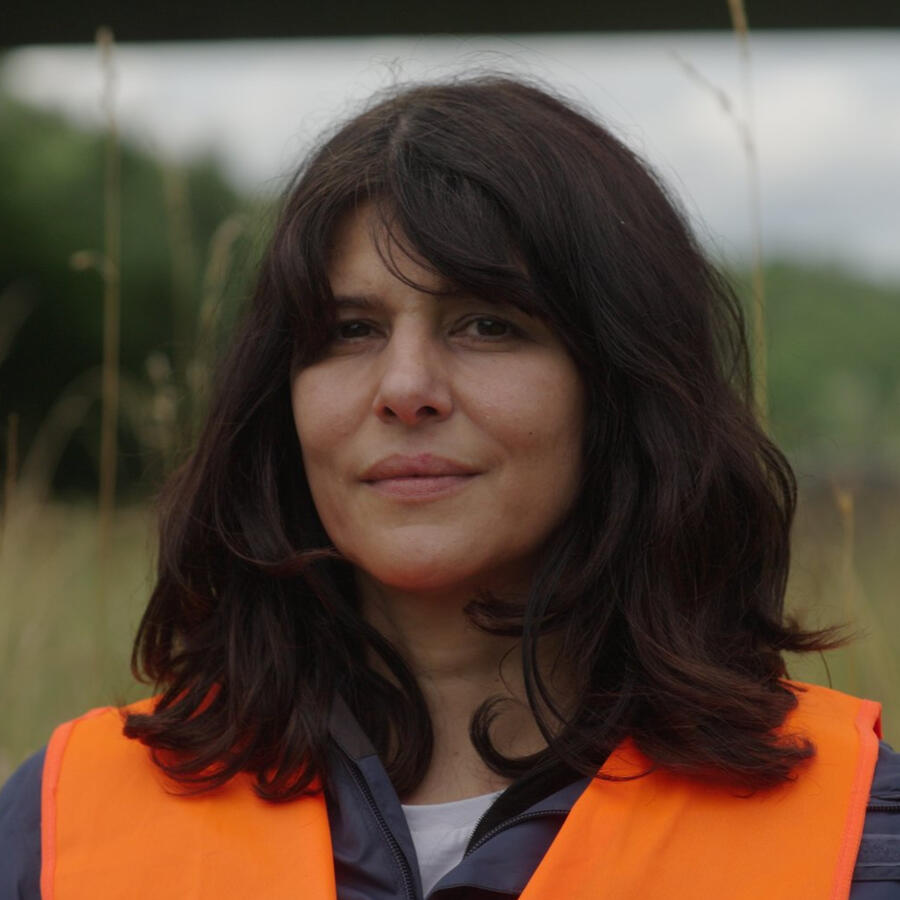COMMON GROUND
An essayistic exploration of isolation and belongingBy Jonathan Jäggi
and Tobias Kubli
FACTS
Country of Production: Switzerland
Language: Swiss German / German
Runtime: 88 minutes
Format: DCP, 1.85:1, ColorCurrent Status: Picture Lock
Completion: January 2026
LOGLINE
After her father’s death, Lilo returns to Zurich’s Allmend, where he spent his final years in solitude. As she listens to this marginal landscape with scientific curiosity and emotional urgency, her search for traces of him turns into a fragile exploration of grief, connection, and belonging.
PROCESS
ALLMEND is a process-based cinematic field study. Developed over three shooting phases between 2024 and 2025, the film takes as its starting point a real place: the Allmend in Zurich. The documentary gaze is interrupted and refracted by a fictional researcher who both observes scientifically and shapes imaginatively. Between the production phases, we analyzed the material, wrote stories, and shaped the film’s structure. The result is a film that oscillates between fact and fiction, between detached observation and poetic construction.
SYNOPSIS
The Allmend in Zurich is a leftover space at the city’s edge, squeezed between the Sihl River, the highway, and a shopping mall. Officially a recreation area, unofficially a refuge for those living between the city’s margins.Lilo moves through this landscape with her blue cart. Using her boom microphone, she listens to the place as if it could speak back. At a small kiosk where dog owners gather each day, she starts talking — about what once was, and what might still be.Her memories begin to blend with those of others. Documentary moments slip into fiction; interviews become short stories; the stories echo her own longing.As Lilo continues her search, her perspective shifts. What began as field research turns into a space of resonance — for farewell, for loss, and for the fragile possibility of connection.The film observes without judgment, inviting the audience to think, to listen, and to take part.
LILO
Lilo (played by Lale Yavaş) is a researcher, a daughter, a seeker. Her father was a man who gradually withdrew from the world until only the Allmend remained — an open space he chose as his refuge.Armed with a recorder, a notebook, and her imagination, Lilo explores this terrain. She measures sounds, collects voices, and writes stories. Between curiosity and vulnerability, she approaches her father — and herself.The documentary material offers impulses; fiction opens spaces for interpretation. Lilo moves within the threshold between research and remembrance, between analysis and poetry.In this tension, a portrait emerges of a woman who, through observing, becomes part of what she observes.
CONTEXT
The project is inspired by Ursula K. Le Guin’s essay "The Carrier Bag Theory of Fiction". Like Le Guin, the film does not follow a heroic singular act, but rather a practice of collecting, carrying, and enduring. Lilo gathers what is often overlooked: voices, people, images. The film follows her method of collecting – a mode of storytelling that doesn't culminate in resolution or punchlines, but finds meaning in the process.At the same time, COMMON GROUND draws on Elinor Ostrom’s research on the commons – the idea that shared resources can, contrary to the "tragedy of the commons" thesis, be managed sustainably. The Allmend in Zurich becomes a conceptual model, a lived practice of negotiation, use, and mutual care. Lilo researches this space – but she also becomes part of it.
CAST
Lale Yavaş as Lilo

Crew
Concept: Jonathan Jäggi & Tobias Kubli
Director: Jonathan Jäggi
Cinematography: Tobias Kubli
Screenplay: Beat Schönenberger
Editing: Tereza Daniell and Jonathan Jäggi
Dramaturgy: Tereza Daniell
Artistic Contribution: Lale Yavaş and Peter Weber
Producers: Dominique Frey, Jonathan Jäggi, Tobias Kubli
Music: Adrian Würsch
Sound Editing: Lara Wedekind & Joel Gilardini
Production Design: Isabelle Simmen
Production: Zurich University of the Arts / Motor Productions GmbH
BIO
Jonathan Jäggi (1993) is a Swiss-Argentinian filmmaker. He holds a Bachelor's degree in Multimedia Production from the University of Applied Sciences in Chur and worked at the production company C-Films. He later studied at the Universidad del Cine in Buenos Aires, Argentina. Currently, he is completing a Master’s degree in Film Directing at the Zurich University of the Arts and works as a multimedia producer for the architecture magazine Hochparterre as well as a freelance filmmaker and artist. His debut film TRANQUILLO (2018) screened at the Hof International Film Festival and was nominated for the Prix du Public at the Solothurn Film Festival. With the expanded cinema project FRACTURA (2024), he performed as part of the International Experimental Film & Video Festival Videoex.
CONTACT
Jonathan Jäggi – [email protected]